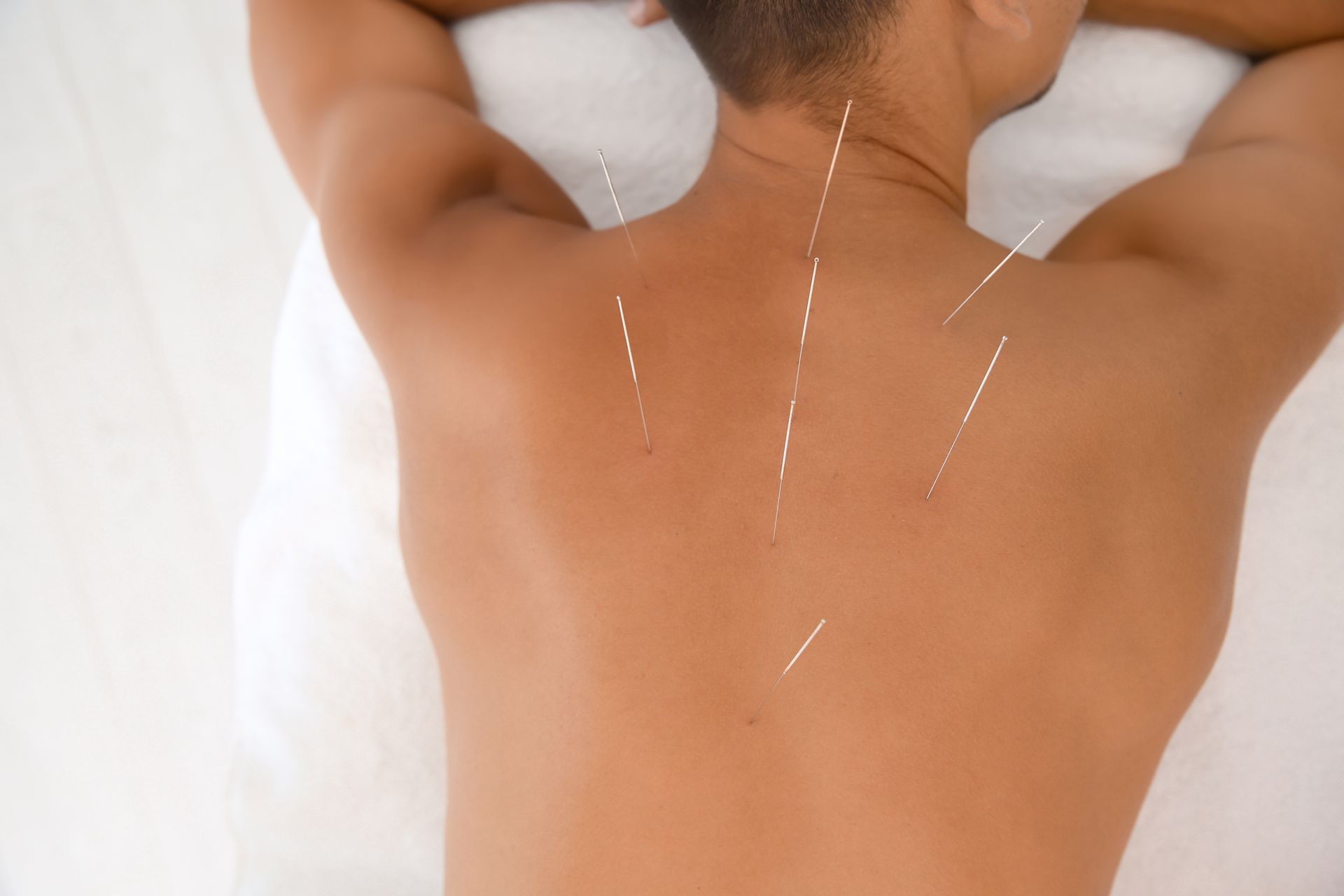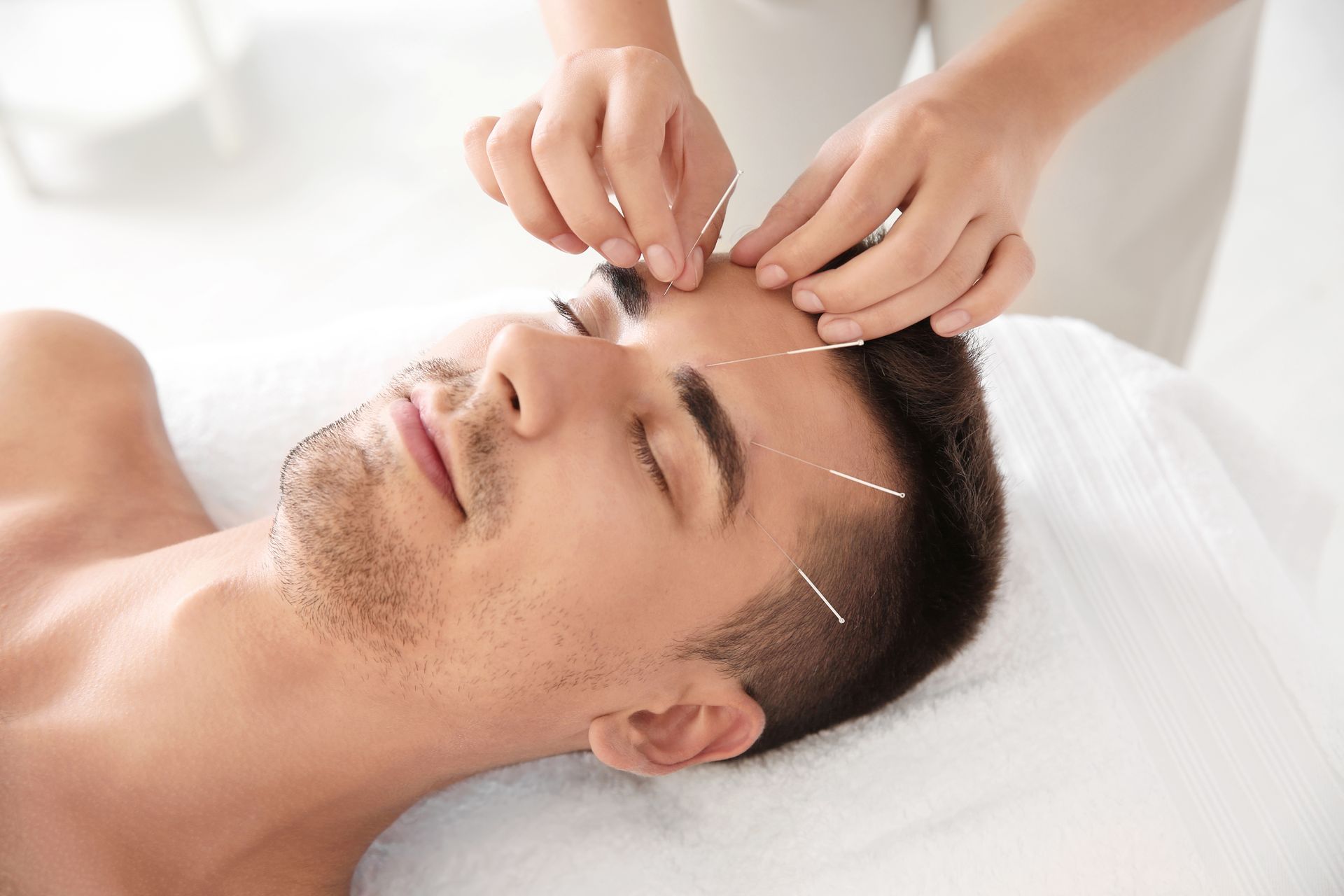Does Acupuncture Help with Male Fertility and Sperm Quality?
Written by: Pulling Down the Moon

One of the odd challenges with finding good scientific data on male infertility is that until recently, most studies have focused heavily on the female burden for infertility, rather than male factor infertility—even though it takes both sides to make a baby! Also, we know that male infertility impacts anywhere from 30 to 50% of all cases of infertility.¹ Lately, one of the most common questions we’ve encountered is whether there is any evidence that acupuncture can help improve male fertility. In the scope of Traditional Chinese Medicine, acupuncture for male fertility is a first-line therapy and has been for centuries. For Western science, however, the jury is still out on a direct causal link between acupuncture and sperm quality. On the other hand, science has found ways that acupuncture improves men’s health that can have a significant impact on fertility generally. Here at Pulling Down the Moon, we are constantly working to help couples increase their chances of getting pregnant using a variety of time-tested and science-backed holistic fertility therapies, including acupuncture for male fertility.
Can Acupuncture Improve Male Fertility?
Because acupuncture is an integral part of Traditional Chinese Medicine (TCM), considerably more research surrounding its efficacy for a wide range of health conditions has been done in Asian countries. The case for whether acupuncture can improve male fertility is no exception. A recent study completed by Chinese researchers and published in a Swiss medical journal finds considerable evidence that acupuncture can help male fertility by improving the following parameters:²
- Regulating hormones
- Reducing inflammation
- Boosting the parameters that impact healthy semen production.
So, from the TCM point of view, the answer is yes, acupuncture for male fertility is a valid therapy. However, how acupuncture might help male fertility is still not fully understood from a Western scientific standpoint. Compared with sham treatments, acupuncture does seem to help with hormone regulation, a key issue with fertility in both males and females. A definitive causal link, however, has yet to be established as far as how acupuncture helps sperm quality. Nevertheless, if there are ways to help remove barriers to fertility, and acupuncture removes some of those barriers, it may be worth a try.
Acupuncture Effects on Sperm
More research on how acupuncture affects sperm compared data across several studies. The results, though somewhat inconclusive, indicated that there was some evidence that acupuncture could improve the shape and motility of sperm cells, and reduce inflammation in male reproductive systems.³ The key takeaway from this meta-analysis is that more research needs to be done before they can conclusively say that acupuncture improves sperm parameters directly. They did also mention, however, that across all the studies they pooled, no adverse effects were found from acupuncture among any of the participants in the studies they analyzed. Certainly, men who want to boost their fertility can try acupuncture as a low-risk, potentially high-reward part of a holistic plan to increase fertility from all different directions, including nutrition, stress reduction, exercise, and other aspects.
Acupuncture for Male Fertility: What Does It Target?
To answer this question, we have to talk about the things that impede male fertility. Once we address those concerns, we can talk about how acupuncture can play a role in supporting improved male fertility. Some things that can get in the way include:

- Nutrition
- Exercise
- Hormone imbalances
- Exposure to environmental toxins
- Genetic factors
- Smoking
- Drug use
- Past infections
- Injuries
- Chronic health conditions
One sweeping meta-study about male infertility causes found that the most important causes were related to physiological (genetic and chronic health conditions), lifestyle, environmental, and socio-demographic risk factors.⁴ While acupuncture can’t remove environmental toxins from your home or workplace, nor can it ensure that you’re eating a balanced diet and getting the right kind of exercise (more on that later), research shows that it can support and target things like stress, inflammation, and hormone imbalances caused by those issues. So, acupuncture for male fertility can be a supportive option.
Additional Benefits of Acupuncture
Since male fertility is tied to a man’s overall health generally, it would make sense for a man wanting to father a child to do all he can to boost his health. There is scientific evidence that acupuncture can support both men and women in ways that will reduce stress and inflammation, which can improve fertility generally. For example:
- There is some evidence that acupuncture can help reduce stress and help people adapt better to stressful situations. The stress-relief aspect of acupuncture seems to also help people with hypertension (high blood pressure) issues, which can also impact fertility.⁵
- Other studies suggest that acupuncture may help improve digestion, which can help reduce gastrointestinal stress and improve nutrient absorption, another key issue for improving fertility.⁶
- Acupuncture may help regulate the immune system in individuals with allergies. Allergic individuals have immune systems that overreact to otherwise harmless things in the environment.⁷
- Some studies also demonstrate acupuncture’s therapeutic effect against insomnia. Getting high-quality sleep is important for all the body’s healing and regulation processes, including fertility.⁸
Again, many of these studies suggested that more research was necessary, although positive effects were recorded. That said, the vast majority of studies recorded that acupuncture provided by a skilled, licensed acupuncturist was safe and presented few if any ill side effects. In all cases, acupuncture is a supportive therapy that researchers suggest patients add to overall lifestyle adjustments.
How Else Can a Man Improve His Fertility?
So, while acupuncture for male fertility is still being studied, it’s important to go back to where acupuncture comes from: Traditional Chinese Medicine (TCM). In TCM, an illness or condition isn’t just a collection of disconnected symptoms that can be treated one by one, without thought to any other system of the body. In TCM, the body is a whole ecosystem where all systems are deeply interconnected. So, when one part of the body is out of balance, other parts will suffer as a result. On the flip side, when balance is restored in one area, it can help support other areas of overall health too, including fertility. So, acupuncture isn’t just one isolated “fix” for male infertility. It’s a supportive aspect that you can mix with other strategies, including the following lifestyle adjustments:
1. Diet
Both TCM and Western medicine are huge proponents of everyone eating a nutritious diet for good overall health. This goes for fertility too. Recent studies in male fertility and nutrition urge men to eat for fertility by cutting saturated fats and focusing on nutrient-rich foods with good amounts of omega-3 fatty acids, zinc, selenium, and coenzyme Q10. In other words, fill your plate with fruits, vegetables, and lean proteins like nuts, seeds, fish, poultry, and low-fat dairy.⁹ Talk to Pulling Down the Moon’s expert fertility nutritionist about individual dietary circumstances and learn ways to give your diet a fertility tune-up.
2. Vitamins
Of course, even if you are eating a super healthy diet, it can be difficult to get all the various nutrients needed to boost fertility. Some studies suggest that supplementing with a mix of important antioxidants, inositol, and L-arginine can help improve sperm parameters and overall fertility.¹⁰ Talk with your doctor and our fertility nutritionist about any digestive issues or health concerns that may be impeding your nutrition absorption, and then discuss potentially adding supplements that can increase levels of nutrients important for fertility that you may not be getting enough of naturally.
3. Exercise
The human body was designed for movement, and we know from scientific studies that a sedentary lifestyle can decrease fertility in both men and women. Specifically, overall physical fitness seemed, in this study¹¹, to improve sperm quality, although they cautioned against particularly strenuous exercise.
4. Lifestyle
In addition to diet and exercise, generally reducing stress, getting high-quality sleep for the body to self-heal its systems, and removing as many environmental toxins from your life as possible is a good idea. For example, if you are still smoking, stop.

Science shows that it hurts sperm health, not to mention overall health.¹² Once again, improving fertility is about looking at the whole picture of your health. If anything is damaging your health, causing digestive issues, stress, or sexual dysfunction, it’s a good idea to look at ways to remove any barriers to your fertility that exist, whatever they are.
Helping Men Boost Their Fertility in Chicago
Here at Pulling Down the Moon, we are eager to help men and women in their efforts to bring happy, healthy babies into the world. We provide an entire suite of
holistic fertility services, including TCM and acupuncture for male fertility (and female fertility) on this journey. Our licensed acupuncturists are true experts in the field and have helped many couples on their path to pregnancy.
Schedule an appointment with us today.
Try an
Initial Acupuncture Consultation with First Treatment and
FEM for Men in June to save for Men's Health month!
Share on Social
Discuss With Us
Our Latest Resources



